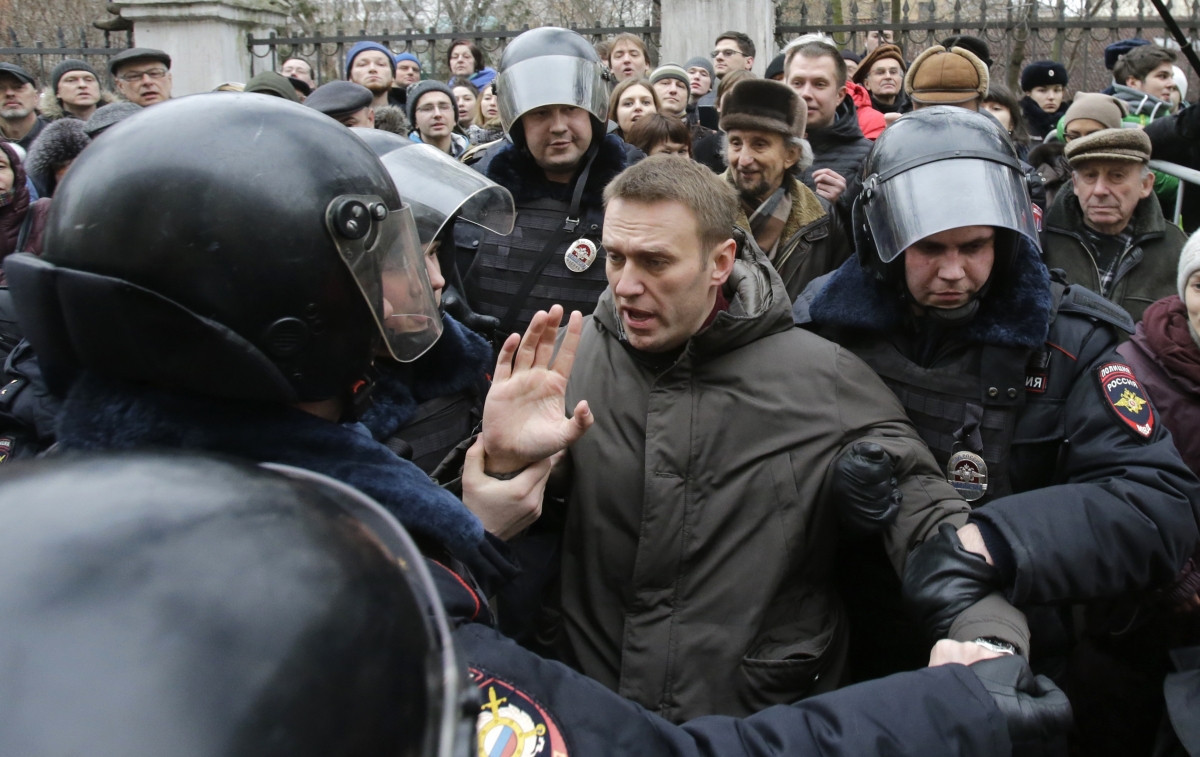
HIGH RISK, LOW REWARD: RUSSIAN OPPOSITION LEADER IN COURT

A Russian regional court will determine the future of one of the country’s most influential opposition figures on Wednesday.
Alexei Navalny, an outspoken critic of Vladimir Putin and his United Russia party, has gained worldwide attention for leading large anti-corruption protests against the president and his comrades, who he infamously labelled a “party of crooks and thieves”. The 39-year-old has been detained numerous times by authorities, notably in 2012 on charges of embezzling funds from a state-owned timber company.
In 2013, Navalny was tried and convicted on these charges but Russia’s Supreme Court overturned that ruling in November, ordering a retrial which will come to a close on Wednesday. If convicted again, the influential opposition leader won’t be able to contest the 2018 presidential election – a boon for Mr Putin.
If history is anything to go by, prosecutors will receive the five-year suspended sentence they’ve requested, forcing Mr Navalny to reconsider his political ambitions.
MPs TO GIVE BREXIT MANDATE

On Wednesday, the UK’s lower house will hold a final vote on whether to grant the government authority to begin Brexit.
Opposition MPs have fought to make some 250 amendments to the authorising bill over the past week, but all attempts have been seen off easily by the Theresa May’s conservative government.
While it’s highly unlikely the prime minister’s Brexit strategy will be forcibly changed on Wednesday, she may concede ground on some non-critical amendments to appease dissenting lawmakers. One such proposed concession might be to provide parliament with quarterly progress reports on the Brexit process.
More controversial amendments – like guaranteeing the rights of EU nationals already in the UK to remain – will not be met; their passage would reduce London’s leverage when hammering out a post-Brexit trade deal with the EU.
Despite Labour instituting a three-line whip – meaning any MPs voting against the bill would face severe party sanction – almost a fifth of its lawmakers disobeyed the order last Friday. This defiance has laid bare the division among the party’s ranks and, perhaps more worrying for Labour votes, a fundamental lack of faith in leader Jeremy Corbyn.
While not having a majority in the upper house may slow the government’s progress, Theresa May is likely to trigger Article 50 by the end of March as promised.
INDIA: MORE LIQUIDITY NEEDED?

India’s central bank will meet to review interest rates on Wednesday.
Last year, the subcontinent laid claim to an impressive title: the world’s fastest-growing major economy. But November’s surprise demonetisation policy – which forced the withdrawal of 86% of the country’s cash from circulation – has taken the sheen off its impressive growth. Just last month the IMF cut India’s forecast by a full percentage point to 6.6%.
Many economists believe the Reserve Bank of India will cut rates by 25 basis points on Wednesday as it tries to revive demand after the demonetisation shock. The policy has driven consumer confidence, consumption and inflation lower, and the central bank will miss its 5% inflation target for March, providing it with wriggle room to cut rates.
Despite the slowdown, Indians have reason for optimism. Just last week, Finance Minister Arun Jaitley announced record government spending on infrastructure and rural development, as well as a tax cut for middle-income earners.
HAPPENING ELSEWHERE…
Somalia will hold much-delayed presidential elections. The vote was meant to be held in August, but security concerns and accusations of fraud resulted in multiple postponements. Despite initially planning for a nationwide election, instability and logistical challenges mean only MPs will vote on Wednesday. Just days before it was meant to be held, the election venue was moved to inside the country’s international airport due to security concerns. Incumbent Hassan Sheikh Mohamud will face 22 other candidates, none of which is expected to win the two-thirds majority needed to claim victory in the first round.
Kuwait’s minister for information and youth, Sheikh Salman Homoud al-Sabah, will face a no-confidence vote in parliament on Wednesday. He’s being held responsible for the country’s 15-month ban from all international sports competitions after accusations the government interfered in key national sporting organisations (which are supposed to be independent).
The UN’s envoy to Syria, Staffan de Mistura, says the country’s opposition has until Wednesday to provide a list of names to include in a delegation to attend peace talks in Geneva on Feb. 20. Previous negotiations have been hampered by a lack of representative delegates.
A high-ranking Iranian foreign affairs official will visit Moscow to discuss Middle Eastern security and the Iran nuclear deal.
Thailand’s central bank will review monetary policy settings.

